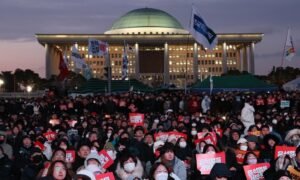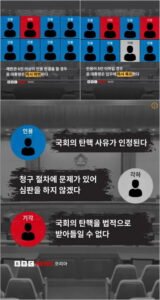
Impeachment Trial of Yoon Suk-yeol: A Comprehensive Analysis
Date: April 16, 2025
Author: Your Name
Introduction
The impeachment of former South Korean President Yoon Suk-yeol marks a significant event in the nation’s democratic history. This article provides a detailed examination of the events leading up to the impeachment, the legal proceedings, and the broader implications for South Korea’s political landscape.
Background: Declaration of Martial Law
On December 3, 2024, President Yoon Suk-yeol declared martial law, citing threats to national security and political stability. This unprecedented move involved deploying military forces to the National Assembly and restricting legislative activities. The declaration was met with immediate backlash from opposition parties and civil society, who viewed it as an overreach of executive power and a threat to democratic institutions.

Impeachment Proceedings
First Impeachment Attempt
The initial impeachment motion was introduced on December 7, 2024. However, it failed to pass due to a lack of quorum, as members of the ruling People Power Party (PPP) boycotted the vote.
Second Impeachment Attempt
A second motion was filed on December 14, 2024, which successfully passed with 204 out of 300 National Assembly members voting in favor. This led to the suspension of President Yoon’s powers, with Prime Minister Han Duck-soo assuming the role of acting president.
Constitutional Court Trial
The Constitutional Court commenced its review of the impeachment on December 16, 2024. The trial focused on whether President Yoon’s actions constituted a violation of the Constitution. Key issues included the legality of the martial law declaration and the use of military force to suppress legislative functions.
On April 4, 2025, the court delivered a unanimous 8–0 verdict upholding the impeachment, citing serious breaches of constitutional duties and democratic principles. :contentReference[oaicite:1]{index=1}

Legal and Political Implications
The court’s decision has several significant consequences:
- Formal removal of Yoon Suk-yeol from the presidency.
- Initiation of criminal proceedings against Yoon for charges including insurrection, which carry severe penalties under South Korean law. :contentReference[oaicite:2]{index=2}
- A scheduled snap presidential election on June 3, 2025, to elect a new leader. :contentReference[oaicite:3]{index=3}
- A reaffirmation of the Constitutional Court’s role in upholding democratic norms and checking executive overreach.
Public and International Reactions
The impeachment has polarized public opinion in South Korea. Supporters of Yoon view the proceedings as politically motivated, while opponents see it as a necessary step to preserve democracy. :contentReference[oaicite:4]{index=4} Internationally, the event has been closely monitored, with allies expressing concern over political stability in the region.
Conclusion
The impeachment and subsequent trial of Yoon Suk-yeol underscore the resilience of South Korea’s democratic institutions. While the nation faces challenges ahead, including the upcoming election and potential legal proceedings, the adherence to constitutional processes reflects a commitment to the rule of law and democratic governance.



